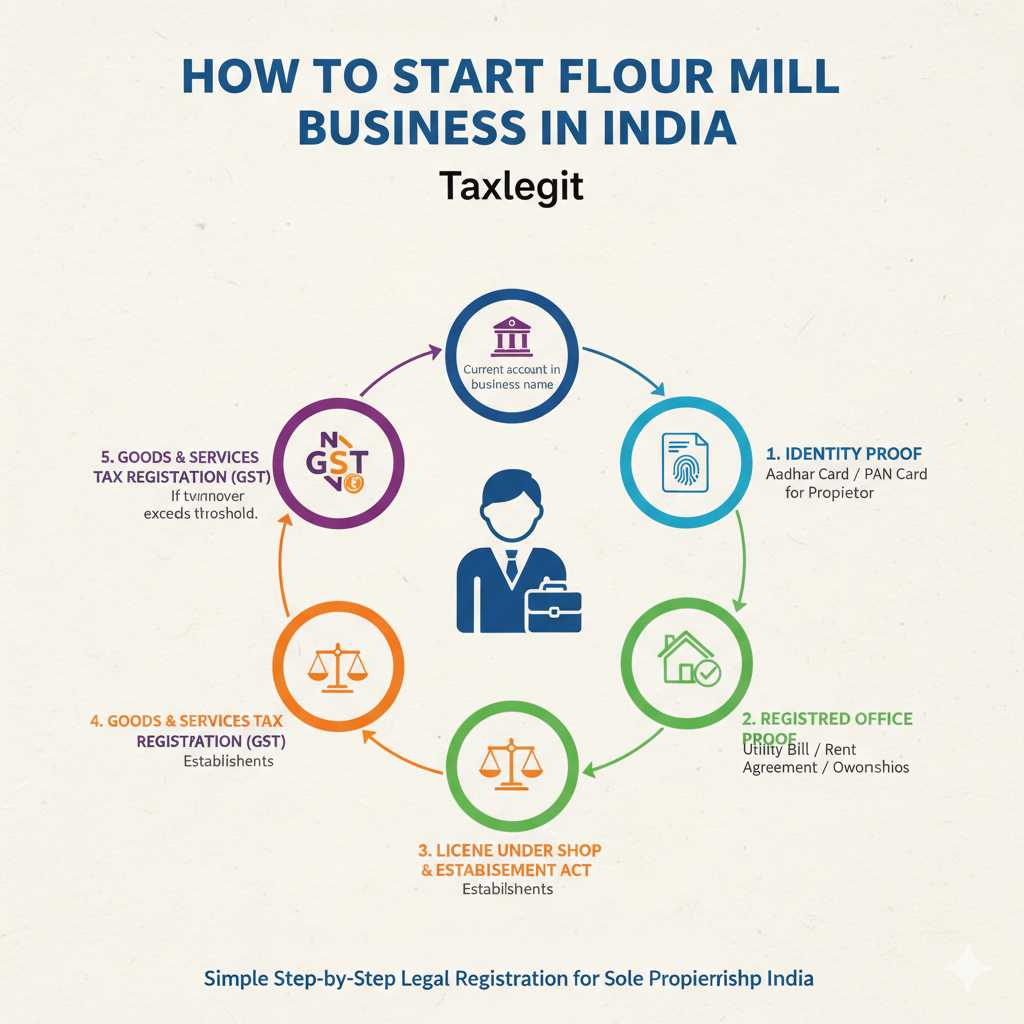-
Ροή Δημοσιεύσεων
- ΑΝΑΚΆΛΥΨΕ
-
Σελίδες
-
Ομάδες
-
Blogs
-
Developers
How to Start Flour Mill Business in India: Complete Guide for Entrepreneurs ?

Starting a flour mill business in India has always been a promising venture. I have helped many clients set up their businesses, and from my experience, proper planning and legal registration are key to running a successful flour mill. In this guide, I will share practical steps on how to start your flour mill, register a private limited company, and complete sole proprietorship registration, making the process smooth for new entrepreneurs.
Understanding the Flour Mill Business
Before starting, it is important to understand the how to start flour mill business in India. I always advise my clients to research the demand in their area, the type of flour they want to produce, and the machinery needed. A small-scale flour mill can serve local customers, while a large-scale setup can cater to supermarkets and wholesalers. Proper planning ensures a steady flow of production and revenue.
Business Plan and Investment
A clear business plan is the first step. I guide clients in estimating costs for machinery, raw materials, storage, and labor. Choosing a location near wheat-producing regions can reduce transportation costs. I also recommend calculating working capital to cover initial expenses until the business becomes profitable. A well-prepared business plan helps in securing loans or investment if needed.
Legal Formalities: Register Pvt Ltd Company
If you want to scale your flour mill business and limit personal liability, register pvt ltd company is the best choice. I assist clients in registering a Pvt Ltd company, which allows them to raise capital and build credibility with suppliers and banks. The process involves selecting a unique company name, applying for digital signatures, and filing incorporation forms with the Ministry of Corporate Affairs (MCA). Once approved, you get a certificate of incorporation, PAN, and TAN for the company.
Sole Proprietorship Registration
For small-scale operations, I often suggest starting as a sole proprietorship. It is simple, cost-effective, and easy to manage. Sole prop registration involves obtaining a business license, registering with GST (if turnover exceeds the threshold), and opening a current bank account in the business name. I guide clients to complete the registration quickly, helping them focus on business operations rather than paperwork.
Machinery and Raw Material Procurement
After registration, I advise my clients to select suitable machinery for their flour mill. Depending on the scale, this could include wheat cleaning machines, roller mills, sifters, and packaging machines. Procuring high-quality wheat from trusted suppliers ensures consistency in flour production. I also emphasize maintaining proper storage facilities to keep raw materials fresh and avoid wastage.
Staffing and Operations
A skilled workforce is crucial. I help entrepreneurs hire operators, technicians, and sales staff. Training staff on machinery handling and hygiene standards is part of my service to ensure smooth operations. Efficient workflow, proper maintenance of machines, and timely delivery help build a reliable brand in the market.
Marketing and Selling Your Flour
Once production is ready, marketing is the next step. I advise clients to start locally through retailers and wholesalers. Branding the flour with attractive packaging and emphasizing quality helps in gaining trust. Online platforms can also be used to reach a wider audience. Building strong relationships with buyers ensures recurring orders and steady revenue.
Compliance and Taxes
Running a flour mill requires compliance with laws and taxes. I guide clients to maintain proper records, pay GST, and follow labor laws. Regular compliance not only avoids penalties but also strengthens the credibility of your business in the market.
Conclusion
Starting a flour mill business in India is rewarding with the right planning and guidance. From creating a business plan to registering a private limited company or sole proprietorship, and managing operations, every step matters. I have assisted many entrepreneurs in setting up their flour mill businesses successfully, and I believe with proper guidance, you too can build a profitable venture. By following the steps mentioned, you can focus on growth while ensuring legal and operational compliance.
- Books
- Software
- Courses
- Ταινίες
- Art
- Causes
- Crafts
- Dance
- Drinks
- Film
- Fitness
- Food
- Παιχνίδια
- Gardening
- Health
- Κεντρική Σελίδα
- Literature
- Music
- Networking
- άλλο
- Party
- Religion
- Shopping
- Sports
- Theater
- Wellness
